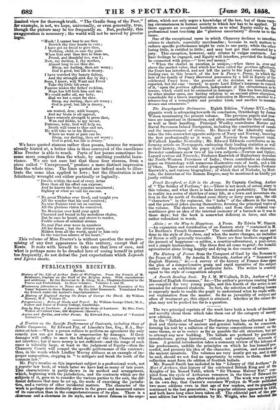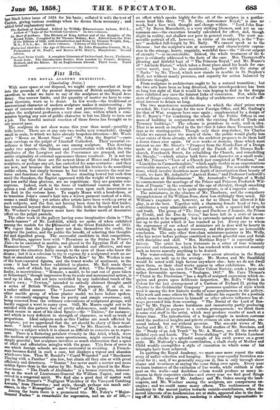. PUBLICATIONS RECEIVED.
Bemis.
History of of the Life of Arthur Duke of Wellington. From the French of M. ont, Captain on the Staff of the Belgian Army. With emendations -
and additions. By the Reverend G. B.. Gleig, M.A., Chaplain-General to the Forces and Prebendary. In three volumes. 'Volumes I. and II.
Missionary Adventures in Texas and Mexico. A Personal Narrative of Six Years' Sojourn in those Regions. By the Abbe Domenech. Translated from the French under the Author's Superintendence. A History of Englana during the Reign of George the Third. By William Massey, M.P. Volume II.
Peloponnesus : Notes of Study and Travel. By William George Clark, M.A., Fellow and Tutor of Trinity College, Cambridge.
Day by Day at Lueknow. A Journal of the Siege of Lucknow. By Mrs. Case, Widow of Colonel Case, 32d Regiment (Queen's.) Amino and Bertha, and other Poems. By Edward Fox, Author of " Poetical Tentatives."
A Treatise on the Specific Performance of Contracts, including those of _Public Companies. By Edward Fry, of Lincoln's Inn, Esq., B.A., Bar- rister-at-law.—When a person refuses to perform an agreement the only remedy you can get from law is contpensation by damages. If these damages will suffice to meet the full equity of the case, Chancery will not interfere ; but if mere money is not sufficient—and the range of such cases is tolerably large, at least in the judgment of Equity—then the Chancery Courts will compel the specific performance of the contract ; thus, in the words which Lindley Murray adduces as an example of im- proper composition, stepping in "to mitigate and break the teeth of the common law."
Mr. Fry's treatise on this important subject is a professional work, not a popular law book, of which latter we have had so many of late years. This characteristic is partly shown in its method and arrangement, which, beginning with the jurisdiction, and the contracts which are the subjects of it, goes on to consider the various parties to the suit, the dif- ferent defences that may be set up, the mode of exercising the jurisdic- tion, and a variety of other incidental matters. The character of the work is perhaps more distinctly shown in the grave and measured nature of its execution limn in the comprehensiveness of its plan. There is a slowness and a dearness in its style, and a latent fulness in the expo- sition., which not only argue a knowledge of the law' but of those vary. ing circumstances in human society to which law has to be applied. if there appears an occasional hesitation as to what Equity really* the professional toast touching the "glorious uncertainty" directs us to the cause.
One of the exceptional cases in which Chancery declines to interfere relates to chattels, especially merchandise ; because in such matters to enforce specific performance might be ruin to one party, while the other losing little, is entitled to little ; and may best get that estimated
jury. This exception, however, only relates to vulgar contracts.
finer feelings be engaged, and Equity will interfere, provided the feelings be connected with price—" love and money." "When the chattel in questioui is unique,—when there is, over.and above the market value, that which has been called the pretium affeetionii the Court has interfered, and not left the is to his legal remedy.. Th i4 leading case this branch a the law 18 Pusey v. Floury, in which the heir of the family of Pusey fleovered possession by a bill m Equity of the celebrated Pusey horn : the grounds of the decision are insufficiently reported, but the case 'turned, to quote Lord Eldon's language in respect of it, upon the pretiurn afeetionis, independent of the circumstance as to tenure, which could not be estimated in damages.' This has been followed by other similar cases, one having relation to an ancient silver altarpiece, remarkable for a Greek inscription and dedication to Hercules, another to a tobacco-box of a remarkable and peculiar kink 'and another to masonic dresses and ornaments."
The Encyclopedia Britannica. Eighth Edition. Volume XVI.-1143 ' tic work is advancing towards its conclusion, Ornithology by James ilson terminating the present volume. The previous papers and trea- tises are important in themselves, and often remarkable for their an
as well as their handling. Principal Woolley contributes Marine
David Stevenson Inland Navigation, including the construction of canals and the improvement of rivers. Mr. Barrow of the Admiralty under- takes the two somewhat opposite subjects of Navy and Norway, knowing the first professionally as it were and Norway from frequent visits. M`Culloch handles Neutrality ; Mi.. Edward Edwards contributes an in- forming article on Newspapers, embracing their leading statistics as well as their history, though the paper is:rather Encycloptedic in character. Brewster condenses anew two of his own subjects—Newton and Optics; Layard revives old Nineveh ; Professor Eastwick of Haileybury describes the North-Western Provinces of India; Owen contributes an elaborate paper on Odontology with numerous illustrative cuts of teeth, and a life of Oken. There are several other geographical articles besides Professor Eastwick's, and various biographies - of which that of Niebuhr, by Merl- vale, the historian of the Roman Empire, may be mentioned as kindly yet justly critical.
Frank Beresford, or _Life in the Army. By Captain Curling, Author of "The Soldier of Fortune," &c.—There is not much of actual story in this volume, and what there is lacks interest and probability. The hook in reality is a series of sketches of army life, at a town and mountain..sta- tion in the far north of Scotland some thirty or forty years ago, the odd " characters " in the regiment, the " larks " of the officers in the town, and the practical jokes among themselves, forming the principal topics of the volume. The sketches are readable ; and from their evident vrai- semblance give an idea of the internal economy of a barrack as it was in those days ; but the book is somewhat deficient in force, and often rather redundant in words.
Alzint ; or the Way to Happiness. A Poem. By Edwin W. Simon. —An expansion and versification of an Eastern story "contained in N. Le Brethon's French Grammar." The versification for the most part done in the style of Don Juan, and when the metre changes, an imitation of Byron is still generally traceable. There are four brothers engaged in the pursuit of happiness—a soldier, a courtier-adventurer, a poet-lover, and a simple husbandman. The three first all come to grief; the humble agriculturist alone living happily and dying in due course of nature.
The History of France from the Conquest of Gaul by the Romans to the Peace of 1856. By Amelia B. Edwards, Author of a "Summary of English History," &c.—A survey of the history of France done upon the plan of a comprehensive grasp and rapid narrative of the subject rather than an exhibition of particular facts. The writer is scarcely equal to the style of composition adopted.
A Fourth Beading Book. By J. M. M'Culloch, D.D., Anther of "A Manual of English Grammar," &c.—The author's previous reading books are compiled for very young pupils, and this fourth of the series is not intended for advanced students. In fact, the selection of reading lessons is expressly made to enable the pupil to understand what he reads with- out explanation from the master. So far as juvenility of subject and often of treatment go, this object is attained ; whether at the outset* plan may not be pushed too far is a question.
The two principal reprints of the week have both a touch of freshnets and novelty about them which take them out of the category of mall new editions. In the "Ballads of Scotland" Professor Aytoun has collected a hun- dred and thirty-nine of ancient and genuine ballads, as he conceives, forming his text by a collation of the various compositions extant on the same theme, so as to restore as far as possible the old structure, but not to attempt any new building. The ballads are prefaced by particular introductions, giving historical, critical, and explanatory accounts of them. A general introduction takes a summary review of the labours of Isis predecessors, unfolds the principles on which he has himself pro- ceeded, and presents his idea of the character, position, and numbers of the ancient minstrels. The volumes are very neatly got rip, and it may be said, should we not find an opportunity to return to them, that tins collection must form the edition of Scottish ballads. Mr. Russell Smith has included in his "Library of Old Authors" IA Mort d' Arthure' that history of the celebrated British King and of the Knights of his Round Table, which "Sir Thomas Malony Knt:' eesa- piled from the cycle of Arthurian romances in the time of Edward the Fourth, and Caxton soon afterwards printed. The work was se populi in its own day, that Canton's -successor Wynkyn de Worde published two more editions even in that age of few readers, and its populariti continued to the last generation ; two popular editions appeared in 1815, and both have long since been taken off'. The editorial part of the pre- sent edition has been undertaken by Mr. Wright, who has selected the last black letter issue of 1634 for his basis ; collated it with the text of caxson, giving various readings when he deems them necessary ; and added brief explanatory notes.
The Ballads of Scotland. Edited by Will/him 7.dmonstoune Aytoun, D.C.L., Author of " Lays of the Scottish Cavaliers." In two voltunea.
La Mort d'Arthtere. The History of King Arthur and of the Knights of the Round Table. Compiled by Sir Thomas Malony, Knt. Edited from the Text of the Edition of 1634, with Introduction and Notes by Thomas Wright, Esq., MA., P.S.A., 8i.c. In three volumes. (Library of Old Authors.) Historical Sketches : the Age of Discovery. By John Hampden Gurney, 3I.A., Prebendary of St. Paul's, and Rector of St. Mary's, Marylebone. Second edition.
Practical Swiss Guide. A complete Itineraryof Switzerland, Savoy, Piedmont, North Italy. The Introductory Routes from London by France, Belgium, Holland, and the Rhine. Bran Englishman Abroad. Third issue. Tenth thousand.



























 Previous page
Previous page